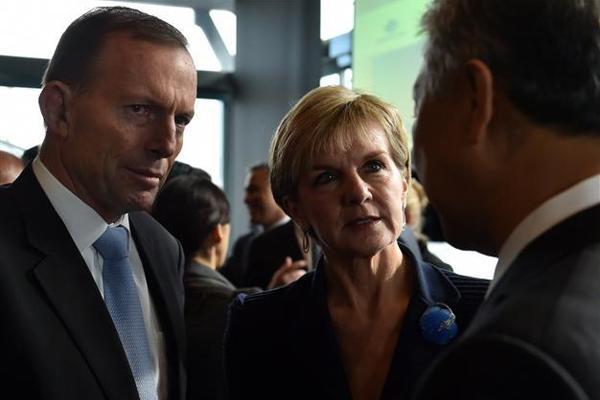Australia tells Indonesia to fix its borders
SYDNEY - Agence France-Presse


This picture taken on June 11, 2015 shows Australian Foreign Minister Julie Bishop (C) and Australian Prime Minister Tony Abbott (L) meeting with delegates at the Regional Countering Violent Extremism Summit in Sydney. Bishop on June 15, 2015 told Indonesia to better secure its borders in a stinging rebuke after Jakarta demanded answers to allegations Canberra paid to turn back a boat of asylum-seekers. AFP Photo
Australia on June 15 told Indonesia to better secure its borders in a stinging rebuke after Jakarta demanded answers to allegations Canberra paid to turn back a boat of asylum-seekers.The response from Foreign Minister Julie Bishop came after the Indonesian foreign ministry on June 13 said if the claims were true, it would be "a new low for the way that the Australian government is handling this issue", while asking for an explanation.
Claims that the captain and five crew of a boat, carrying migrants from Bangladesh, Myanmar and Sri Lanka, were each paid US$5,000 by an Australian immigration official to turn back to Indonesia were made to Indonesian police on Rote island in the country's east last week.
Australian Prime Minister Tony Abbott has refused to deny the allegations, and came under pressure in parliament June 15 from the opposition Labor Party which has asked the auditor-general to investigate.
The Greens party has also referred the matter to the Australian Federal Police for answers on possible payments.
"This government does not feel the need to broadcast our intentions and our tactics to our enemies," Abbott told parliament.
Bishop suggested in an interview with The Australian newspaper that Indonesia was to blame for failing to properly manage its borders.
"I look forward to hearing the full results of Indonesia's investigation of the people-smuggling crimes committed in Indonesia," she said.
This, she added, should include "any breaches of passport and visa laws, and establishing whether the captains and crews of these boats are part of people-smuggling syndicates or are paid by them".
"The best way for Indonesia to resolve any concerns it has about Operation Sovereign Borders is for Indonesia to enforce sovereignty over its borders," Bishop said, referring to Australia's anti-people smuggling policy.
"Operation Sovereign Borders is necessary because Indonesian boats with Indonesian crews are leaving Indonesia with the express intention of breaching our sovereignty, facilitated by illegal people-smuggling syndicates."
Agus Barnas, a spokesman for Indonesia's security ministry, said Bishop was wrong to simply blame his country and warned that if the payment allegations were true it "will drive Indonesian crew and fishermen to race among themselves for extra money".
"Indonesian waters are vast and we have limited manpower," he told AFP.
"And we are not talking about one or two migrant boats, but many. They are run by syndicates and they enter illegally so we cannot deal with this matter on our own.
"The migrant issue must involve cooperation among source, transit and destination countries. Do not just blame Indonesia."
Abbott's conservative coalition implemented a tough immigration policy after coming to power in September 2013 that included military-led efforts to turn back such boats, which mostly come from Indonesia.
The hardline policy also involves sending asylum-seekers that arrive by boat to camps on the Pacific islands of Nauru and Papua New Guinea despite strong criticism from rights groups. They are banned from settling in Australia even if found to be genuine refugees.
Only one boat with asylum-seekers has reached the Australian mainland since December 2013. Before the policy was introduced, boats were arriving almost daily, with hundreds drowning en route.
Abbott on June 14 said the key message for Indonesia was that his government was "prepared to do what's necessary" to prevent unwanted boats arriving in Australian waters.
Immigration Minister Peter Dutton backed him up in parliament on June 15, saying Australia would do "whatever it takes, within the law, to meet our international obligations to stop the people smugglers".
Labor immigration spokesman Richard Marles said the claims were affecting bilateral ties which were already strained after Indonesia executed two Australian drug-smugglers in April, with Canberra temporarily recalling its ambassador in protest.
Asked if he agreed with Bishop, he replied: "I don't think now is the time for the Australian government to be walking down that path."
